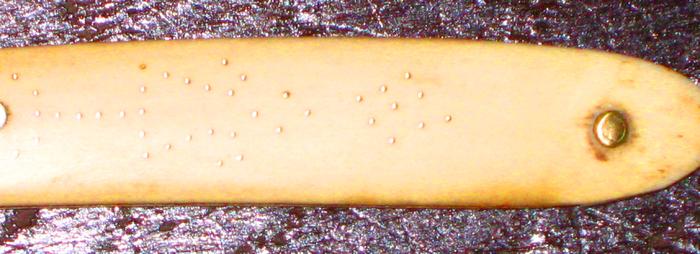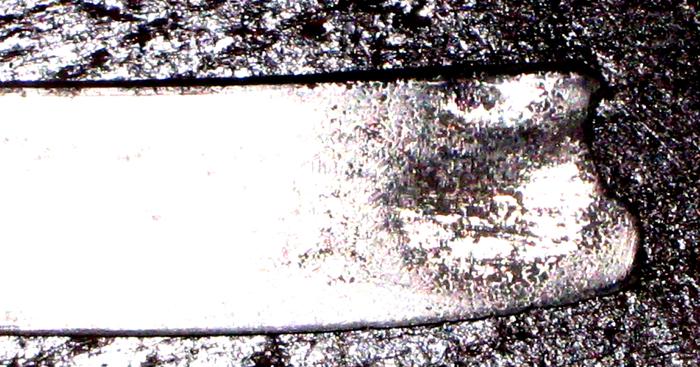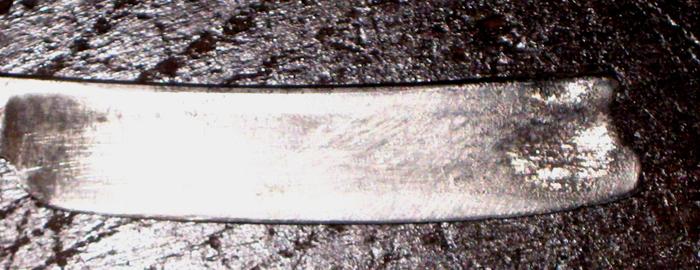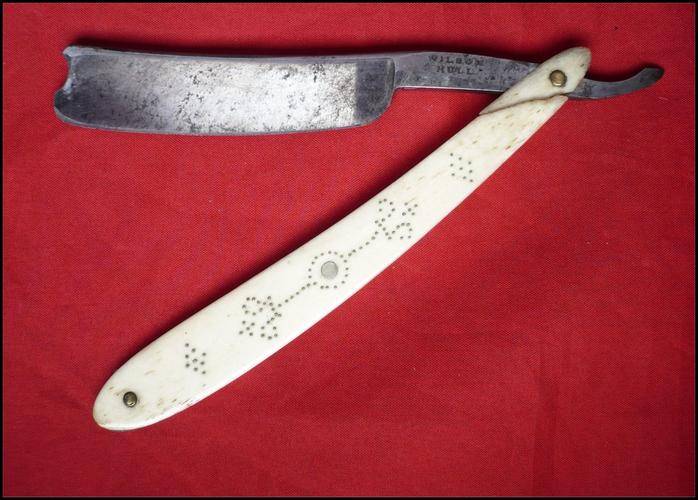Results 1 to 8 of 8
-
10-03-2012, 05:53 PM #1
 More help, a unknown maker wilson hull
More help, a unknown maker wilson hull
To be correct I buy this razor for the price and the box....
 but I finally found a very pretty razor, but made by a unknown for me maker, the mark is not completly but I could find the WILSON HULL sawing anothers similar. Wel if you can say me anythin about the date and the maker IŽll be ethernaly gratefull, Thanks again
but I finally found a very pretty razor, but made by a unknown for me maker, the mark is not completly but I could find the WILSON HULL sawing anothers similar. Wel if you can say me anythin about the date and the maker IŽll be ethernaly gratefull, Thanks again
-
10-03-2012, 06:40 PM #2

Don't know but it sure looks like a good 'un. Muy bueno , Congrats.
-
The Following User Says Thank You to JimmyHAD For This Useful Post:
Robertoreigosmendez (10-03-2012)
-
10-05-2012, 05:11 PM #3< Banned User >

- Join Date
- Dec 2011
- Location
- Lakewood, WA
- Posts
- 533
Thanked: 56
Hey There!
So I have done some research for you and there are a lot of razor makers with the surname in/around Sheffield England. Hull is right near (50 miles away) Sheffield. I wouldn't wonder that this razor was made in around 1820-1850 before putting the country of manufacture was mandatory, hence the place name Hull. The Wilson's I have found (in Goin's) operated from around 1800 - 1953 so this hypothesis could be correct. No dead certs though sorry just a strong inkling. It does look like a Sheffield razor too!
From an admirers point of view those are some gorgeous scales, and the razor looks mighty fine, AND if I were you I would treasure every shave!!
Thanks
Carl - SRH
-
The Following User Says Thank You to straightrazorheaven For This Useful Post:
Robertoreigosmendez (10-06-2012)
-
10-06-2012, 03:46 PM #4

Were I to be forced into a guess, I'd figure 1840's, 1850's just based on the form. And, yes! Those scales are beautiful, makes me wonder if he owner did the decorating himself, which would be something I admire. worth preserving for sure. Great find.
-
The Following User Says Thank You to stimpy52 For This Useful Post:
Robertoreigosmendez (10-06-2012)
-
10-06-2012, 06:23 PM #5

Hard to see, are the scales "penned" as in silver pins through the holes, or are the holes drilled shallow?
Nice old one, for certain!"Don't be stubborn. You are missing out."
I rest my case.
-
The Following User Says Thank You to sharptonn For This Useful Post:
Robertoreigosmendez (10-06-2012)
-
10-06-2012, 07:20 PM #6Senior Member



- Join Date
- Apr 2008
- Location
- Essex, UK
- Posts
- 3,816
Thanked: 3164
There are certainly a lot of razor makers associated with Sheffield and the close, outlying district, but I haven't been able to find one in Hull. Here is a short list of the Sheffield makers:
Thomas Wilson, born 1796, recorded as a razor maker in 1841 living in Norwich St., Sheffield
George Wilson, born 1779, recorded as a razor smith living in 1851 living in Ecclesall Bierlow in 1851, recorded as razor smith in 1841 living in Hallam
Frederick Wilson, born 1803, recorded as a razor maker in 1851. living in Hallam in 1841
John Wilson, born 1811, recorded as a razor smith in 1841 living in North Sheffield and a razor blade forger living in Sheffield in 1861
John Wilson, born 1812, recorded as a razor smith lving in Ecclesall Bierlow in 1851 and Nether Hallam in 1861 and as a razor smith cutter in 1881
Joseph Wilson, born 1813, recorded as a razor smith living in Eccleshall Bierlow in 1851
Note that I have excluded all those listed as 'razor grinders' (they were not makers), haft makers, scale pressers, scale cutters, butchers knife and blade makers, pocket/penknife.spring-knife/bowie knife makers and all those I arbitrarily judge as being too late in the timeline.
Most of the names are pulled from census records, where birthplace and residence at the time of the census are quoted - not one of them is shown as anywhere near Hull.
There may be others whose listings I have not found (quite probable!) and others not especially noted for being razor makers. The blade looks like a quality blade and a Sheffield forging, but there is no makers mark on the blade - just a name. This mostly happens when a cutler or dealer is offered a number of razors at a reduced price by a traveller/agent for a noted Sheffield maker (a common practice), but with the dealers own name stamped on the blade. Hence no makers mark.
The scales are quality items - bone inlaid with silver pins - known as 'piquet' work (this is a subdivision of the piquet work carried out on tortoiseshell and horn, where the metal object was heated, melted its position into the scale and adhered to it). The holes did not penetrate the full width of the scale. It appears that the a pattern - a piece of card or similar with holes in it - was placed on the scale, the holes marked, drilled shallowly and a very thin annealed silver pin snipped of a coil and inserted. Slight hammering expanded the pin in the hole. Some people think a glue might have been used, others think it was just the silver being very soft from annealing it and hammering it to make it slightly wider. I have seen a number of examples where pins have fallen out - there doesn't seem to be any trace of glue in the holes, though.
It was a highly skilled occupation, and sets of scales were bought in from specialists usually. In fact it seems that most of the scale-making in Sheffield in the 1700s and 1800s was done by people who specialised in just that work - they sawed mother of pearl, ivory, etc while others formed sheets from horn which was bought by others who moulded it into shape or pressed patterns into it. The 'setters-in' in the razor makers premises set the blades into these scales. Occasionally we find one man responsible for all aspects of the blade, from forging and grinding to setting in, (ie a 'little mester') but scale making nearly always seems to be outsourced to another party. The exceptions are the really big firms like Rodgers who could afford to keep an enormous workforce on the premises.
Regards,
Neil
-
The Following 3 Users Say Thank You to Neil Miller For This Useful Post:
maddafinga (10-06-2012), Robertoreigosmendez (10-06-2012), sharptonn (10-06-2012)
-
10-06-2012, 11:54 PM #7

Well, first of all, thank to all of your studyes, and for shown me it, here, in Spain and mainly in Galiza, the place I write in the north, there are no many kinds of blade razors makers, we only have Jose Montserrat Pou with the trade mark Filarmonica, but only after the last years of the XIXth century, you could find the Palmera trade mark too, but earlyer, and a but number of local makers in Madrid Euzkadi and Catalunya but no more and the most of them in the XX century, is comun find english razors, and german razors ones of Sheffield an the others of Solingen, I prefer the english ones and I colect them, but is imposible not to find in the meadle some german razors, I use one Bengall, and one Filarmonica and one Palmera, ocasionally another I posted here days ago that only remains in itŽs blade the rest of a crown, You remenber?, with this one the scales were not a problem, they are intact, the problem is the blade, not usually, I got the razor clened by a antiquarius, and completly damaged the blade, if you know any solutions to restaure it ad use it iŽll be so greatefull to get them; IŽll post one or two photos more to see you the problems with the blade and the decoration of the scales, thanks for all and not that here in Spain is easy find english razors, if you want I could send you web directions were you coud buy them by a little price, here there arenŽt tradition to use or collect this items, thanks again for all





-
10-07-2012, 12:01 AM #8

From Willson Hull I only found you could found easily in google Home of Taylors1000 Straight Razor resources site but is interesting that the other one I found repeats the same scales decoration It could be a total maker
 ?
? 


 6Likes
6Likes
 LinkBack URL
LinkBack URL About LinkBacks
About LinkBacks






 Reply With Quote
Reply With Quote
